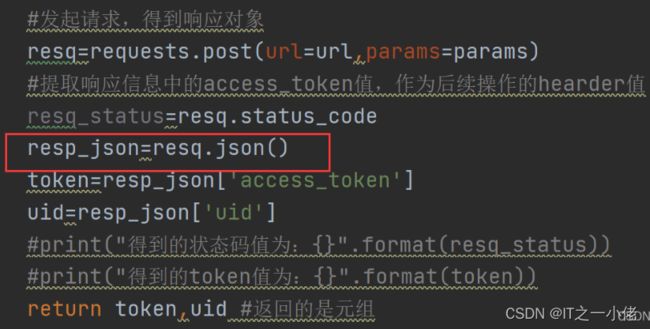python中json用法详解
1、json.dumps()、json.dump()、json.loads()和json.dumps()的区别:
- json.dumps()用于将字典形式的数据转化为字符串
- json.loads()用于将字符串形式的数据转化为字典
详见博文:json.dumps()、json.dump()、json.loads()和json.dumps()的区别_IT之一小佬的博客-CSDN博客
代码如下:
import json
dict1 = {'A': 'a', 'B': 'b', 'C': 'c'}
print(type(dict1))
print(dict1)
# python编码为json类型,json.dumps()
en_json = json.dumps(dict1)
print(type(en_json))
print(en_json)
# json解码为python类型, json.loads()
de_json = json.loads(en_json)
print(type(de_json))
print(de_json)
# eval()解析json
dict2 = {'X': 'x', 'Y': 'y', 'Z': 'z'}
en_json = json.dumps(dict2)
de_json = eval(en_json)
print(type(de_json))
print(de_json)
运行结果:
{'A': 'a', 'B': 'b', 'C': 'c'}
{"A": "a", "B": "b", "C": "c"}
{'A': 'a', 'B': 'b', 'C': 'c'}
{'X': 'x', 'Y': 'y', 'Z': 'z'} 2、处理request请求返回的json数据:
有2种方法可以处理request返回的数据:
1.对request发起请求返回的响应对象进行.json()操作,.json操作返回的是一个字典类型(如果返回的结果为空时则会报错),如下:
2.对request请求得到的响应对象中的text数据进行json.loads(text)操作,操作后返回的是字典类型(建议使用这种方法,使用前判断text是否为空,为空也会报错),如下:
3、在python中使用json格式存储数据
示例代码:
import json
list1 = [{'A': [1, 2, 3, 4, 5, 6], 'B': [3, 4, 5, 6, 7]},
{'C': '123', 'D': '234'}]
# 将数据写入文件
file = open('json_demo.json', 'w')
for i in list1:
json_i = json.dumps(i)
file.write(json_i + '\n')
file.close()
# 从文件中读取数据
get_data = []
with open('json_demo.json', 'r') as f:
# 读取数据并分割,最后一个为空,所以去除
new_list = f.read().split('\n')[:-1]
for x in new_list:
json_x = json.loads(x)
print(type(json_x))
get_data.append(json_x)
f.close()
print(f'原始数据为:{list1}')
print(f'结果数据为:{get_data}')运行结果:
原始数据为:[{'A': [1, 2, 3, 4, 5, 6], 'B': [3, 4, 5, 6, 7]}, {'C': '123', 'D': '234'}]
结果数据为:[{'A': [1, 2, 3, 4, 5, 6], 'B': [3, 4, 5, 6, 7]}, {'C': '123', 'D': '234'}] 4、对json数据进行转义
使用json在线转义工具:JSON在线 | JSON解析格式化—SO JSON在线工具
使用代码进行转义,示例代码如下:
import json
dic = {'name': 'dgw', 'sex': '男', 'age': 26, 'grade': [{'语文': 96}, {'数学': 99}]}
print(dic)
# json数据是双引号
json_dic = json.dumps(dic, ensure_ascii=False)
print(json_dic)
# 对json_dic数据进行转义
json_dic_escape = json.dumps(json_dic, ensure_ascii=False)
print(json_dic_escape)
# 对dic数据中某个字段单独转义
dic['grade'] = json.dumps(dic['grade'], ensure_ascii=False)
json_dic_escape2 = json.dumps(json.dumps(dic, ensure_ascii=False), ensure_ascii=False)
print(json_dic_escape2)
# 对json_dic_escape2数据进行转义解码
json_dic_escape_decode = json.loads(json_dic_escape2)
print(json_dic_escape_decode)
with open('text.txt', 'a', encoding='utf-8') as f:
f.write(str(dic) + '\n')
f.write(json_dic + '\n')
f.write(json_dic_escape + '\n')
f.write(json_dic_escape2 + '\n')
f.write(json_dic_escape_decode + '\n')
运行结果:
注意:控制台有时候打印的转义符号和写入文件中的转义符号有区别!
5、各种数据类型转换为json格式
将常见的数据类型格式转换为json格式。
示例代码:
import json
s = 'I love you!'
lst = ['aa', 'bb', 'cc']
dic = {"name": "dge", "age": 26}
_set = {'aaa', 'bbb'}
s_json = json.dumps(s)
print(type(s_json), s_json)
lst_json = json.dumps(lst)
print(type(lst_json), lst_json)
dic_json = json.dumps(dic)
print(type(dic_json), dic_json)
# 注意:下面写法是错误的,set集合类型的对象是不可以JSON序列化的
# set_json = json.dumps(_set)
# print(type(set_json), set_json)
运行结果:
注意:set集合类型的对象是不可以JSON序列化的
示例代码:
import json
_set = {'aaa', 'bbb'}
# 注意:下面写法是错误的,set集合类型的对象是不可以JSON序列化的
# set_json = json.dumps(_set)
# print(type(set_json), set_json)
# 可以先将集合类型转换为列表类型
set_json = json.dumps(list(_set))
print(type(set_json), set_json)
_set = set(json.loads(set_json))
print(type(_set), _set)
运行结果:
有序字典也是可以通过json直接转换为字典格式的。
示例代码:
import json
from collections import OrderedDict
dic = {"name": "dgw", "address": "beijing", "date_updated": "Sun, 11 Dec 2022 13:14:25 -0000"}
order_dic = OrderedDict(dic)
print(type(order_dic), order_dic)
order_dic_json = json.dumps(order_dic)
print(type(order_dic_json), order_dic_json)
运行结果:
6、各种数据类型转换为json格式写入文件
示例代码:
import json
s = 'I love you!'
lst = ['aa', 'bb', 'cc']
dic = {"name": "dge", "age": 26}
_set = {'aaa', 'bbb'}
# 字符串
with open('./string.json', 'w', encoding='utf-8') as f:
f.write(json.dumps(s))
# 列表list
with open('./list.json', 'w', encoding='utf-8') as f:
f.write(json.dumps(lst))
# 字典dict
with open('./dict.json', 'w', encoding='utf-8') as f:
f.write(json.dumps(dic))
# 集合set
# 注意:TypeError: Object of type set is not JSON serializable
# 注意:set集合类型的对象是不可以JSON序列化的
# with open('./set.json', 'w', encoding='utf-8') as f:
# f.write(json.dumps(_set))
# 将集合转换成字符串格式是可以写入文件的
with open('./set.json', 'w', encoding='utf-8') as f:
f.write(str(_set))
7、json中使用separators消除空白
示例代码:
import json
dic = {"name": "dge", "age": 26}
with open('./text.txt', 'w', encoding='utf-8') as f:
f.write(json.dumps(dic))
# 使用separators消除空白
with open('./text2.txt', 'w', encoding='utf-8') as f:
f.write(json.dumps(dic, separators=(',', ':')))
运行结果:










